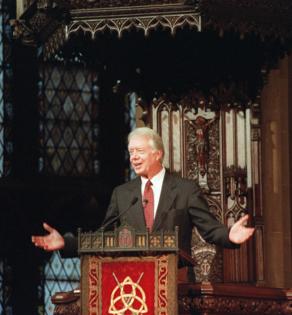Commentary: Jimmy Carter's election was a high point in resurgence of progressive evangelicals
Published in Op Eds
In November 1973, a group of evangelicals met at the YMCA on Wabash Avenue and adopted the Chicago Declaration of Evangelical Social Concern. Echoing the themes of progressive evangelicalism from decades past, the declaration decried income inequality and militarism as well as the persistence of racism and hunger in an affluent society. The declaration also included a forthright embrace of women’s rights and gender equality.
Roughly a year later, on Dec. 12, 1974, Jimmy Carter announced his candidacy for president, drawing on many of those same themes, as well as his frequently repeated promise that he would never knowingly lie to the American people. He pledged his commitment to pursue racial reconciliation, health care reform, human rights, a reduction of nuclear weapons and a less imperial foreign policy.
Carter’s outsider status, coupled with his evident probity, provided a tonic to an electorate weary of Watergate and Richard Nixon’s endless prevarications. On his way to the White House, Carter effectively rid his party — and the nation — of its most pugnacious segregationist, George Wallace of Alabama, by beating Wallace in the Florida Democratic primary.
He also benefited from a resurgence of progressive evangelicalism in the 1970s, the movement that takes seriously Jesus’ words to care for “the least of these.”
In earlier decades of American history, progressive evangelicalism had animated various movements of social reform, including the abolition of slavery (among evangelicals in the North), public education, prison reform and advocacy for women’s rights. Many evangelicals were involved in peace movements, and some evangelicals even doubted the morality of capitalism because it elevated avarice over altruism and therefore ran counter to the teachings of Jesus.
Charles Grandison Finney, the most famous and influential evangelical of the 19th century, argued that capitalism “recognizes only the love of self” and “the rules by which business is done in the world, are directly opposite to the gospel of Jesus Christ, and the spirit he exhibited.” The man of business, by contrast, lives by the maxim: “Look out for number one.”
Carter’s election represented the high point in the resurgence of progressive evangelicalism in the 20th century, and the new president sought to govern according to those principles.
His first official act as president was to pardon Vietnam-era draft resisters, thereby helping bring that sorry chapter in American life to a close. He renegotiated the Panama Canal treaties, and in so doing signaled an attenuation of American colonialism, especially to the countries of Latin America. He advanced peace in the Middle East far beyond anything accomplished by his predecessors (or his successors). He recalibrated foreign policy away from a reflexive Cold War dualism and toward an emphasis on human rights. On domestic matters, Carter sought to limit the incidence of abortion, and he is still regarded by many as the nation’s greatest environmental president ever.
So why would evangelicals, who helped propel Carter to the presidency in 1976, turn against him four years later? Why would they reject one of their own, a born-again evangelical Christian, in favor of a divorced and remarried former actor who, as governor of California, had signed into law the most liberal abortion bill in the nation?
Evangelicalism itself was deeply divided in the 1970s. Carter’s understanding of the faith, shaped by progressive evangelicalism, pushed him toward the left of the political spectrum, whereas many white, Northern evangelicals, following the lead of Billy Graham, had gravitated toward the Republican Party. Nixon’s damage to the Republican brand had briefly altered that calculus in the mid-1970s, and Carter harvested a far greater percentage of evangelical votes than any of his Democratic predecessors.
Conservatives, however, were eager to regain their footing after the disastrous Nixon presidency, and several savvy political operatives conspired to do so. Paul Weyrich, the architect of the religious right, had long recognized the political potential of evangelical voters. If he could mobilize them, he reasoned, he could reshape the political landscape.
By Weyrich’s own account, he tried various issues over the years to lure conservative evangelicals into the political arena — abortion, pornography, school prayer, the proposed Equal Rights Amendment — but nothing worked. By the mid-1970s, however, he finally found the issue that would energize them: the attempt by the Internal Revenue Service to deny tax exemption to institutions that engaged in racial discrimination.
This caught the attention of officials at Bob Jones University and Jerry Falwell, who had opened his own segregation academy in 1967. They disingenuously decried government interference into religious matters, neglecting to mention that tax exemption is a form of public subsidy, and then cannily shifted their rhetoric away from the defense of racial segregation toward opposition to abortion, hitherto a “Catholic issue.”
What followed was the mass mobilization of white evangelicals into a movement known as the religious right. Their support for Reagan in 1980 initiated a decadeslong alliance with the far-right precincts of the Republican Party that culminated in overwhelming support for Donald Trump.
Although progressive evangelicals remain active in American life, the heyday of progressive evangelicalism, marked by the Chicago declaration and Carter’s presidency, came tragically to a close in 1980.
Throughout his remarkable post-presidency, however, Carter enlarged the sphere of his progressive activism — pursuing peace, ensuring democratic elections, eradicating tropical diseases — beyond the White House to the entire world.
____
Randall Balmer is the John Phillips professor in religion at Dartmouth College and is the author of “ Redeemer: The Life of Jimmy Carter” and “ Bad Faith: Race and the Rise of the Religious Right.”
___
©2024 Chicago Tribune. Visit at chicagotribune.com. Distributed by Tribune Content Agency, LLC.




























































Comments